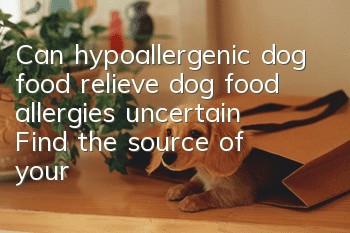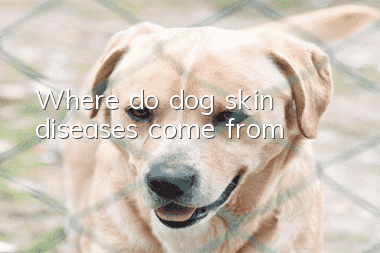Can hypoallergenic dog food relieve dog food allergies? uncertain! Find the source of your allergy and you'll be cured

Nowadays, many dogs are regarded as the apple of their eyes by their owners, and they want to give them the best in terms of food, clothing, housing and transportation. Especially when it comes to food, most dogs are greedy, and their owners will always think of ways to satisfy them, with a constant supply of cans of various snacks or supplements. But in fact, this may cause the dog to scratch all the time, because these foods may contain substances that the dog is allergic to.
Adverse skin reactions to food in dogs
Adverse skin reactions to food are skin abnormalities caused by food, including food hypersensitivities and food intolerances. According to statistics, 62% of dogs suffering from allergic skin diseases are caused by adverse skin reactions to food. In other words, more than half of dogs with skin allergies are caused by food factors.
Food allergy is actually a problem with the dog’s immune system. There is no way to accurately judge whether the substances entering the dog’s body are harmful, so they are treated as harmful substances like bacteria and viruses. An overreaction of the immune system causes allergic symptoms in dogs. Foods like corn, peanuts, wheat, egg whites, and pork can be allergens.
In addition, some dogs lack the corresponding enzymes in their bodies, leading to food intolerance. For example, humans are lactose intolerant because their digestive system lacks the lactase enzyme necessary to hydrolyze lactose, or is particularly sensitive to other chemicals contained in food. For example, some people are intolerant to caffeine and will feel stomach discomfort as long as they drink caffeinated drinks.
Food allergies are most common in dogs between 2 and 6 years old, and there are certain breed predispositions, including American Cocker Spaniels, Boxers, Collies, Dachshunds, German Shepherds, Golden Retrievers, and Miniature Schnauzers. Dog breeds such as , Poodles and West Highland White Terriers are more susceptible to allergies than other dogs. Some owners know that their dogs are allergic and may buy some hypoallergenic dog food in the hope of controlling it. Because every dog reacts differently to allergies, there is no one hypoallergenic diet that works for all dogs. The U.S. Food and Drug Administration says diets labeled to control allergies can only be prescribed and sold by veterinarians.
Symptoms of food allergies in dogs
Dogs at home often scratch themselves, and many owners simply think it is a skin disease. But it may be that food causes skin allergies, because the owner is not aware of it, so he keeps letting the dog eat the food that makes it allergic. Generally speaking, the symptoms of food sensitivity include frequent itching and hair loss, skin inflammation and redness, such as redness and swelling around the eyes, ventral ears, genitals or anus, as well as vomiting, diarrhea, flatulence and other symptoms. Usually, allergy symptoms most commonly occur on the skin and digestive system. However, this does not mean that all skin and digestive system abnormalities are caused by food exposure.If you suspect that your dog is allergic to food, it is best to take your dog to the hospital for examination and rule out other possible diseases.
Treatment methods for dog food allergies
The only way to treat a dog’s food allergy is to identify the source of the allergy. Usually, by avoiding specific ingredients, the dog’s allergic reaction can be cured without treatment. However, it is not easy to find the allergens, because there are many reasons for dogs to be allergic, and different allergic symptoms often appear interactively, making judgment more difficult.
For detecting allergens, doctors will use the elimination method to conduct a 10-12 week food allergy diagnosis to determine the dog’s allergens. Let the dog eat a special food that contains a unique source of protein that it has never eaten before and so should not be allergic to. If the dog is found not to be allergic, the ingredients in his original diet are added to the diet one at a time to see which foods cause symptoms to return. Once the allergen is identified, avoid feeding this food to your dog in the future and you will no longer be allergic.
In fact, many times, dogs’ food allergies are caused by the owner’s negligence. If you want to change the dog's food or try something new, it is best to let the dog try a little bit first to see if the dog will have any adverse reactions, and then increase the amount as appropriate.
- What can’t dogs eat? Ten foods that dogs should avoid!
- How to prevent canine distemper infection in pets?
- Is it good for dogs to drink cold water in winter?
- What should I do if my dog takes three times the amount of deworming medicine?
- Is it better for a female dog to be neutered or not to be neutered?
- What Shepherd Dogs Like to Eat and Dietary Precautions in Dog Feeding
- What to do if your dog loses hair in autumn
- How to teach a golden retriever to walk
- How many owners does a golden retriever know in its life?
- How long does it take for a dog to become paralyzed after patellar luxation?



